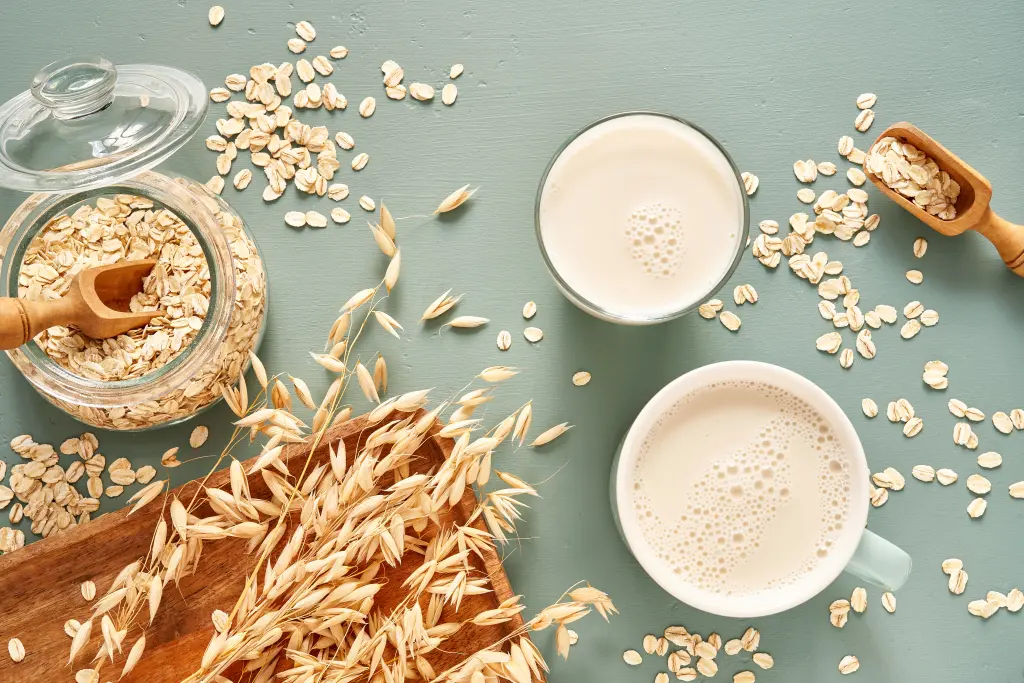In recent years, plant-based milk has become the go-to choice for many, especially those with lactose intolerance or concerns about animal welfare. With the promise of better health, lower calories, and reduced fat, it’s no wonder these alternatives have found their way into households across the globe. But are these dairy-free options as healthy as they seem? Experts now warn that certain ingredients in plant-based milk could increase the risk of colon cancer, raising concerns about its safety and long-term health impact.

The Rise of Plant-Based Milk: Is It Really Healthier?
As traditional cow’s milk consumption declines in America, plant-based milk sales have surged. Whether made from almonds, oats, soy, or other sources, these alternatives offer variety and perceived health benefits. Many people see them as healthier options compared to cow’s milk. However, while they are often lower in calories and saturated fat, research indicates that plant-based milks are not nutritionally equivalent to dairy. In fact, about one-third of these alternatives contain sugar levels similar to flavored milk.
This disparity raises questions about whether plant-based milk truly lives up to its healthy reputation. The inclusion of additives and emulsifiers, such as gelatin, xanthan gum, and carboxymethylcellulose (CMC), qualifies many of these milks as ultra-processed foods (UPFs). But what exactly makes these ingredients so concerning?
Emulsifiers in Plant-Based Milk: A Hidden Threat?
Emulsifiers are common additives in plant-based milk, used to enhance texture and prevent separation. While they improve the creamy feel of the beverage, these substances may have unexpected health risks. Research has found that emulsifiers can disrupt the gut microbiome—an essential collection of bacteria, viruses, and fungi in our digestive system that plays a crucial role in our overall health.
Two emulsifiers, CMC and polysorbate 80, have been specifically linked to colon cancer in mice. Studies indicate that these additives alter the gut’s bacterial composition, promoting inflammation. Chronic inflammation, in turn, damages DNA and increases the risk of cancer.
In a 2021 study, scientists introduced emulsifiers to bacteria similar to those found in the human gut. The result? The bacteria were compromised or died, showing how deeply these additives can affect gut health. If the gut microbiome becomes imbalanced, it could increase susceptibility to colorectal cancer.
The Alarming Rise of Colon Cancer in Younger Adults
Over the past two decades, colon cancer cases among adults under 55 have doubled, making up 20% of diagnoses in 2019 compared to just 11% in 1995. This younger demographic often faces late-stage diagnoses, making treatment and recovery more difficult. Researchers are exploring various factors contributing to this trend, including diet, lifestyle, and environmental influences.

Many plant-based milks qualify as UPFs, a category of consumables experts believe could be fueling the colon cancer epidemic in young people.
The role of ultra-processed foods, including plant-based milk, in this rising trend is now under scrutiny. Many experts believe that the increasing consumption of UPFs may be linked to the surge in colon cancer rates. Dr. Maria Abreu, a professor of medicine and immunology, emphasizes that even seemingly healthy foods can disrupt gut health, potentially leading to inflammation and cancer.
Blood Sugar Spikes: Another Concern with Plant-Based Milk
Emulsifiers aren’t the only problematic aspect of plant-based milk; its carbohydrate content also raises health concerns. Unlike dairy and nut milk, oat milk is notably lower in protein and higher in carbohydrates. When the body processes these carbs, it results in a rapid spike in blood sugar levels. Repeated spikes can make it difficult to manage weight and increase the risk of lifestyle diseases, such as diabetes.

Is it time to ditch non-dairy milks?
Jessica Cording, a registered dietitian, explains that blood sugar management is essential for both physical and mental well-being. The frequent consumption of high-carb plant-based milks could lead to insulin resistance over time, which is a precursor to type 2 diabetes and other metabolic disorders.
What You Need to Know About Ultra-Processed Foods
Ultra-processed foods, defined by their inclusion of industrial ingredients like emulsifiers, preservatives, and artificial flavorings, have become a significant part of the modern diet. They may offer convenience, but they also come with hidden dangers. These foods can disrupt the gut’s microbial balance, weakening the body’s natural defenses and increasing the likelihood of diseases such as colon cancer.
Researchers argue that one of the best ways to protect gut health is by minimizing the intake of UPFs. This includes being mindful of the ingredients listed on plant-based milk labels. Opting for brands with fewer additives or choosing homemade versions can help reduce exposure to potentially harmful substances.

Emulsifiers like those found in many non-dairy milks, have been known to disrupt the gut biome.
Balancing Plant-Based Choices with Health Awareness
So, does this mean that you should stop drinking plant-based milk? Not necessarily. While the recent findings are concerning, it’s essential to consider the broader context. Plant-based milk can still be a good option for those with dietary restrictions or ethical concerns, but awareness of ingredients is crucial.
When choosing a plant-based milk, look for options labeled as organic, with minimal or no emulsifiers. Reading labels carefully and avoiding those with a long list of additives can help minimize risks. Additionally, balancing plant-based milk consumption with whole foods, such as fruits, vegetables, and grains, can improve gut health and reduce inflammation.
Conclusion: Rethink Your Plant-Based Milk Choice

Some plant-based milks can cause blood sugar spikes.
While plant-based milk offers an alternative for those seeking a dairy-free lifestyle, it is essential to be cautious about its ingredients. The presence of emulsifiers and high carbohydrate content can pose risks, potentially impacting gut health and increasing the likelihood of colon cancer. To protect your well-being, make informed choices by checking labels, opting for minimally processed options, and focusing on a balanced diet. Remember, even foods marketed as healthy can have hidden dangers—your best defense is knowledge and moderation.


